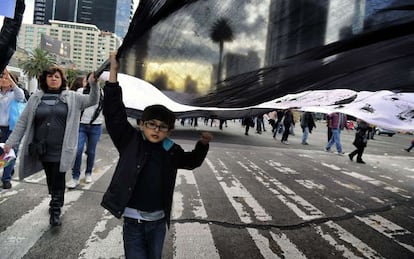Why 2014 is a year for Mexico to forget
The Iguala student massacre has been disastrous for Peña Nieto's second year in office

On November 7, Mexico’s Attorney General Jesús Murillo Karam held a press conference to explain that witness testimonies were pointing the blame for the massacre of 43 students on a police-drug gang, led by the town mayor. By the end of the long session with reporters he was clearly exhausted. “I have grown tired,” he told the press.
Those four words reflect the neglect of Mexico’s institutions when it comes to dealing with inefficiency and criminal corruption. Thanks to the horrific details from the Iguala massacre investigation, these issues have become worldwide news.
The year began filled with optimism. President Enrique Peña Nieto continued to push through a series of far-reaching legislative reforms he introduced in 2013, and that were expected to propel Mexico’s growth to nearly four percent. But during the past few months it became clear it would take more time to see the benefits of changes that have been made to the country’s three biggest growth-generators: energy, finance and telecommunications.
The president’s reforms quickly lost steam and were overshadowed by the sudden drop in oil prices
The president’s reforms quickly lost steam, and during the last quarter they were overshadowed by the sudden drop in oil prices and devaluation of the Mexican peso against the dollar. The economic slump and the Iguala case were the perfect ingredients for a brewing political storm that led to press investigations into conflict-of-interest claims when it was revealed that first lady Angélica Rivera and Treasury Secretary Luis Videgaray allegedly received homes from a top government contractor.
As Peña Nieto enters his third year of a six-year term in office, the forecasts for Mexico’s annual growth figures are much poorer than expected: economists believe that the country will end 2014 with GDP growth at between 2.1 and 2.6 percent.
The president and his Cabinet also face the pressure of hundreds of thousands of Mexicans who have taken to the streets since the Iguala student massacre. Still, Peña Nieto and his Revolutionary Institutional Party (PRI) government are banking on his energy reform to reap political as well as economic benefits. For the first time in 76 years, the state-owned monopoly, Petróleos de México, will open its energy sectors to private investment. Contractors are expected to sign on later this year. The objective is to attract new investment and increase production, which has dropped by 30 percent over the last decade.
Nevertheless, the sharp fall in oil prices because of the heightened production of OPEC member nations and the United States could turn many investors away.
The wounds of Guerrero and its neighboring state Michoacán are still fresh in everyone’s minds
It seems unlikely that Mexico’s economy will help buoy the presidency through the year. But it is more likely that Peña Nieto’s greatest challenge will be in security. The wounds of Guerrero and its neighboring state Michoacán, where violent confrontations between armed citizens groups and drug traffickers exploded earlier last year, are still fresh.
It is a paradox for Peña Nieto, who planned his presidential agenda by focusing on the economy, while in the long term he had hoped to win the confidence of Mexicans through his anti-crime operations, such as the arrest of the internationally wanted notorious drug kingpin, Joaquín “El Chapo” Guzmán in February. The Mexican navy, with the help of the United States, captured the elusive head of the Sinaloa Cartel in a surprise operation. Once placed on the Forbes list as one of the richest men in the world, El Chapo now sits in a maximum security prison.
There was some optimism in the spring thanks to the achievements of some prominent Mexicans: on March 2, Alfonso Cuarón won an Oscar for Best Director for Gravity, while the following month, author Elena Poniatowska received the Cervantes Prize in Spain.
The literary world also mourned the deaths this past year of poet Juan Gelman, an Argentinean who lived for many years in Mexico City, and died there on January 14 at the age of 83. Another poet, Mexican José Emilio Pacheco, also died in January at the age of 74. But literature’s biggest lost was the April 17 death of Gabriel García Márquez, the greatest Spanish-language novelist of the 20th century. García Márquez, a Colombian who lived for decades in Mexico City, died at the age of 87.
Tu suscripción se está usando en otro dispositivo
¿Quieres añadir otro usuario a tu suscripción?
Si continúas leyendo en este dispositivo, no se podrá leer en el otro.
FlechaTu suscripción se está usando en otro dispositivo y solo puedes acceder a EL PAÍS desde un dispositivo a la vez.
Si quieres compartir tu cuenta, cambia tu suscripción a la modalidad Premium, así podrás añadir otro usuario. Cada uno accederá con su propia cuenta de email, lo que os permitirá personalizar vuestra experiencia en EL PAÍS.
¿Tienes una suscripción de empresa? Accede aquí para contratar más cuentas.
En el caso de no saber quién está usando tu cuenta, te recomendamos cambiar tu contraseña aquí.
Si decides continuar compartiendo tu cuenta, este mensaje se mostrará en tu dispositivo y en el de la otra persona que está usando tu cuenta de forma indefinida, afectando a tu experiencia de lectura. Puedes consultar aquí los términos y condiciones de la suscripción digital.








































